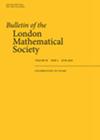Smallest totient in a residue class
IF 0.9
3区 数学
Q2 MATHEMATICS
引用次数: 0
Abstract
We obtain a totient analogue for Linnik's theorem in arithmetic progressions. Specifically, for any coprime pair of positive integers such that is odd, there exists such that .



剩余类中的最小对象
我们得到了等差数列中林尼克定理的一个完整的类比。具体来说,对于任意正整数对(m, a) $(m,a)$且m $m$为奇数,存在n≤m 2 + o (1) $n\leqslant m^{2+o(1)}$使得φ (n)≡a(对m取模)$\varphi (n)\equiv a\ (\mathrm{mod}\ m)$。
本文章由计算机程序翻译,如有差异,请以英文原文为准。
求助全文
约1分钟内获得全文
求助全文
来源期刊
CiteScore
1.90
自引率
0.00%
发文量
198
审稿时长
4-8 weeks
期刊介绍:
Published by Oxford University Press prior to January 2017: http://blms.oxfordjournals.org/

 求助内容:
求助内容: 应助结果提醒方式:
应助结果提醒方式:


